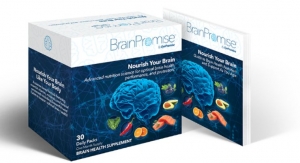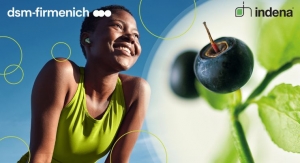Lisa Olivo, Associate Editor12.03.15
With the elderly at increased risk for dementia, aging consumers are looking for ways to preserve their mental capacity.
The number of those impacted by failing brain health is on the rise, according to Alzheimer’s Disease International’s “The World Alzheimer Report 2015.” Globally, there will be 9.9 million new cases of dementia this year, equating to one new diagnosis every three seconds. An estimated 46.8 million people internationally are living with the condition, with predictions suggesting this number will nearly double every 20 years. By 2030, it’s anticipated that 74.7 million people worldwide will be living with dementia, contributing to approximately $2 trillion in healthcare costs.
In light of this serious threat to minds around the world, sales of brain health products have been steadily climbing. “According to a Euromonitor International report, the brain health market reached $1.5 billion in 2013 and might even be worth more than $2 billion today,” commented Steve Siegel, vice president of Ecuadorian Rainforest, LLC, Belleville, NJ.
Innova Market Insights Market Analyst Natalie Tremellen reported global supplement product launches with a brain health/mood health positioning increased by 12.4% in 2014, up from 2013. She added, “A wide range of ingredients are used in these types of products, and many of these have traversed to food and beverages, for brain health claims, including vitamin B6 and B12, taurine, choline, magnesium and of course DHA [docosahexaenoic acid].”
Consumers are looking for safe and efficacious products to protect and preserve their minds. “Overall, consumers are looking for products that are clinically studied and backed by strong scientific evidence,” said Elyse Lovett, MBA, MS, marketing manager, Kyowa Hakko U.S.A., Inc., New York, NY. “It is projected that approximately 30 million adults take supplements for brain health, where men under the age of 50 are most likely to use supplements for cognitive health. In addition, one out of five adults not taking cognitive health supplements express strong interest in trying them (Gallup, 2014).”
Considering the Audience
While the aging demographic makes up a significant portion of the market for brain health supplements, they’re just one part of a larger equation. Innova’s Ms. Tremellen explained, “Well over two-thirds of global launches tracked by Innova Market Insights in 2014 with a brain health positioning were baby foods, particularly infant formulas and milks, where DHA is often used for its brain development attributes.” Excluding the baby food category, Ms. Tremellen said the leading subcategories in 2014 for brain health product launches were tea with 1.9% of product launches, followed by milk and milk drinks (1.8%) and breakfast cereals (1.7%).
Mitch Skop, senior director of new product development, Pharmachem Laboratories Inc., Kearny, NJ, suggested a variety of consumers are attracted to the brain health category, with products available to benefit young and old. “Active seniors are more focused on retaining memory functions, middle-agers are keen on promoting and maintaining cognitive function, and young adults and students want to promote increased focus and concentration,” he said. “Yet any individual at any age may recognize that high-stress life situations or burnout also impacts ability to focus and concentrate, and this is another aspect of brain support.”
Dietary supplements targeting performance, focus and cognitive function are also important subcategories, according to Nicolas Meyrial, vice president of sales and business development in North America for Israel-based Frutarom Health BU. He suggested that a younger demographic is looking for ways “to maximize their cognitive potential as a way to optimize their performance levels and better function” at work, school or in the athletic arena.
With parents recognizing how important proper nutrition is to the development of their children, more moms and dads are looking toward natural products to support their kids’ growing minds. “Parents are looking to find natural ways of protecting their children’s brains with proper nutrition,” explained Mr. Siegel of Ecuadorian Rainforest. “Parents believe a fortified brain may help their children perform better at school or prevent the rise of an attention-deficit disorder.”
Mothers are particularly in need of nutritional support during pregnancy and lactation, and key ingredients can benefit the brain of their growing child. Becky Wright, marketing director, Aker BioMarine Antarctic US, Issaquah, WA, noted, “pregnant and nursing moms realize the benefits of omega-3s for normal brain development as well as their own mood maintenance.”
However, she suggested, brain health supplements are for everyone, at every age. “Maintaining a healthy brain throughout life—from infancy to adulthood—is crucial and research continues to show that omega-3s help play a key role in early brain development. By starting during pregnancy and continuing throughout childhood and adulthood, omega-3s like those found in krill help people maintain a wide range of brain functions, such as memory, mood and cognition.”
Vitamins & Minerals
A variety of vitamins and minerals have been clinically proven to support brain function in numerous ways.
“To some degree, all minerals are involved in brain health,” stated Max Motyka, consultant for Albion, Clearfield, UT, but he suggested those that play the greatest role are zinc, magnesium, iron and copper.
For example, he noted, “zinc has been shown to improve memory and learning ability via its role in the way that neurons communicate with one another within the brain. Neurons deprived of zinc communicate far less effectively, and this impairs memory and the ability to learn (Xiao-an Zhang, et al. Neurons, 2011).”
In addition, he described how low magnesium values have been associated with a range of neurological diseases, such as migraines, depression, Parkinson’s and epilepsy. Supplementation with magnesium, he said, “has positive impacts on these brain diseases, and it has been shown to be beneficial to stroke victims and in cases of traumatic brain injuries.”
Mr. Motyka outlined magnesium’s mechanisms of action, which he described as diverse and multifaceted. “Some of its effects are due to its role in the regulation of N-methyl-D-aspartate (NMDA) receptor excitability, others are due to its function in GABA receptors, as well as decreasing oxidative stress (traumatic brain injury),” he said. “Magnesium also plays a role in improving memory (Joroen H.F. de Baaij, et al. Physiological Reviews, 2015).”
AIDP, City of Industry, CA, offers magnesium l-threonate under the name Magtein—a unique patented compound discovered by MIT scientists. It has been shown in animal studies to improve brain neuron density. Vice President of Marketing and Business Development Kathy Lund, claimed, “Magtein is the only magnesium compound that has been shown to effectively raise the brain’s magnesium levels, which leads to enhanced learning abilities, working memory, and short- and long-term memory in both young and aged animals. In four published preclinical studies, Magtein was found to improve cognitive health and memory.” The company also stressed that a key benefit to Magtein is its high level of bioavailability.
Iron is an essential component in the neurological development of the brain in infants and children, according to Mr. Motyka. “Iron deficiency in infancy leads to abnormalities in neurotransmitter metabolism, myelin sheath formation and alterations in brain energy metabolism [Journal of Nutrition, 2003].” He also noted that in adulthood, iron deficiency is associated with changes in behavior and a decline in cognition and brain function.
Bryan See, regional product manager, ExcelVite Inc., noted vitamin E provides a host of benefits for the brain. The Malaysian company produces the scientifically substantiated ingredient for brain health, EVNol SupraBio, a bio-enhanced natural full spectrum tocotrienol/tocopherol complex. EVNol SupraBio is Non-GMO Project Verified, Kosher and Halal certified.
Citing clinical research demonstrating the effects of vitamin E, Mr. See explained, “European epidemiological studies led by researchers from renowned academic institutions such as the Karolinska Institutet of Stockholm, Sweden and University of Perugia, Italy—collectively found that blood plasma levels of all vitamin E forms (i.e., tocopherols and tocotrienols) in an elderly population play an important role in the development of mild cognitive impairment and Alzheimer’s disease (AD). These four studies [Mangialasche F., et al. 2010, 2012, June 2013, Dec. 2013] with over 600 elderly participants revealed that high plasma levels of full-spectrum vitamin E (tocopherols and tocotrienols) are associated with improved cognitive function and a reduced risk of AD in advanced age, with tocotrienols being more potent than tocopherols in preventing AD.”
In addition, long-term studies funded by the National Institutes of Health (NIH) found that tocotrienols provide post-stroke brain protection. Mr. See stated, “Over a decade of U.S. NIH-funded in vitro and in vivo research has led to the discovery of tocotrienols’ (EVNol SupraBio) unique neuroprotective effect and elucidation of its mechanism in reducing damage from toxic- and stroke-induced brain injuries.”
This research, conducted at the Ohio State University Medical Center, found that tocotrienols at very low concentration (10-9, nanomolar level) cross the blood-brain barrier to reach the brain and exert protective effects against stroke-induced injuries. “A large animal model trial in canines showed that 10 weeks of 200 mg twice daily supplementation of EVNol SupraBio softgels resulted in significantly smaller stroke-induced lesion volume, prevented loss of white matter fiber tract, and arteriogenesis was triggered to increase blood flow to ischemic area,” he explained. Mr. See added that this group of researchers, led by Prof. Chandan Sen, is now conducting a phase 2 human clinical trial referred to as “NUTRITION: Natural Tocotrienol Against Ischemic Stroke Event.”
Lastly, a recent human clinical trial published in the American Heart Association’s journal Stroke (2014), reported that EVNol SupraBio supplementation for 2 years at 200 mg twice daily slowed down the development of white matter lesions (WMLs) in the human brain. “WMLs are closely related to vascular events of the brain and are indications of a fragile brain vascular network, and an independent prognostic measure of future stroke risk,” stated Mr. See. This study involved 121 subjects—the largest human clinical study ever conducted for tocotrienols to date, he noted.
Omega-3s
Numerous clinical studies support omega-3s for promoting healthy brain function and development.
New research presented at the 8th International Conference on Clinical Trials for Alzheimer’s Disease (CTAD) in Barcelona, Spain, indicated that omega-3 supplementation may help slow cognitive decline in older adults, especially those who have mild cognitive impairment (MCI).
The Multidomain Alzheimer’s Preventive Trial (MAPT) was designed to assess the efficacy of supplementation with omega-3s on the change in cognitive functions in subjects 70 years and older with subjective memory complaints. In addition to supplementation, the MAPT program consisted of nutritional counseling, exercise and cognitive and social stimulation.
A group of nearly 1,700 older adults with memory complaints, slow walking speed, and limitation of at least one instrumental activity of daily living, were enrolled in the study. Participants were randomized to one of four groups: placebo, omega-3 supplementation (800 mg DHA per day), placebo plus multidomain intervention, and omega-3 plus multidomain intervention.
Six months after starting the program, and then again at 12, 24 and 36 months, the participants were tested to evaluate episodic memory, orientation, executive function and verbal fluency. Results found that omega-3s along with a healthy lifestyle consisting of good nutrition, exercise, cognitive and social stimulation can help maintain cognitive function among elderly participants.
In a press release from DSM Nutritional Products, Parsippany, NJ, supplier of omega-3 ingredients life’sDHA and MEG-3, Dr. Manfred Eggersdorfer, senior vice president, nutrition science & advocacy, and Professor for Healthy Aging at Groningen University, said, “Despite medical advancements, Alzheimer’s disease death rates increased by nearly 68%, between 2003 and 2008. This underlines the importance of understanding the disease further. The results of the study could be used to help revise and establish more accurate clinical guidelines regarding micronutrient supplementation including omega-3 fatty acids to help support cognitive health in older adults.”
Adding to this body of research, a recent meta-analysis published in PLOS ONE (March 2015) examined studies on supplementation with DHA and EPA (eicosapentaenoic acid) in healthy subjects 18 years or older and how it impacted episodic, working and semantic memory domains.
Results found that episodic memory outcomes of adults with mild memory complaints were significantly improved with DHA/EPA supplementation. In addition, regardless of cognitive status at baseline, less than 1 gram/day DHA/EPA improved episodic memory. Benefits of DHA supplementation were also shown for semantic and working memory. It was also found that observational studies support a beneficial association between intake/blood levels of DHA/EPA and memory function in older adults. Researchers concluded that DHA alone or with EPA could support memory function in older adults with mild memory complaints.
Discussing research supporting omega-3s for brain function, Ms. Wright of Aker BioMarine underscored how “sufficiently high intake of omega-3s has been linked with maintaining and enhancing cognitive function among the elderly. Therefore, adequate consumption of omega-3s is recommended to maintain memory performance and reduce the risk of developing mild memory problems associated with aging.” She added that some research suggests omega-3 supplementation can help children focus, thus positively impacting their behavior and learning.
Superba Krill, Aker BioMarine’s flagship product, is a potent omega-3 product in the brain health category. Highlighting the benefits of krill, Ms. Wright explained, “Omega-3 fatty acids are crucial nutrients for brain health, and phospholipid omega-3s in particular play key roles in the proper structure and function of brain cell membranes and cell signaling. In fact, omega-3s bound to phospholipids are delivered more efficiently to brain tissue compared to omega-3s carried as triglycerides. This is why the brain prefers omega-3s in phospholipid form.”
Despite the plentiful research backing omega-3s for brain health, research conducted by NIH and recently published in the Journal of the American Medical Association concluded omega-3 supplements did not slow cognitive decline in the elderly, causing skepticism and controversy in the mainstream media. In response, the Global Organization for EPA and DHA Omega-3s (GOED), Salt Lake City, UT, suggested flaws in the study’s design.
The research was conducted as an adjunct to the AREDS2 study (Age-Related Eye Disease Study), which examined how a combination of nutritional supplements could impact the advance of age-related macular degeneration (AMD). Seeing an overlap in the demographics impacted by AMD and age-related cognitive decline, Emily Chew, MD, deputy director of the Division of Epidemiology and Clinical Applications and deputy clinical director at the National Eye Institute (NEI), and her team, sought to evaluate whether the AREDS2 combination of omega-3 DHA (350 mg) and EPA (650 mg) impacted brain function. Participants, who were on average 72 years old and female, were given cognitive function tests at the start of the study to establish a baseline, with follow up evaluations two and four years later. The validated tests evaluated recall, attention memory and processing speed—all of which decreased over time regardless of the nutrients being administered.
Responding to this study, GOED argued 350 mg DHA was in no way a significant amount to support cognitive function. According to a blog written by GOED Executive Director Adam Ismail, “The recent AREDS2 results—and the resulting media coverage—need to be put into context and looked at within the total body of evidence around omega-3s and brain health.”
He suggested that when it comes to omega-3s proper dosage makes all the difference. “If you listen to the media, the story is ‘High dose’ omega-3s did not slow the rate of cognitive decline in this population. Yet the supplement that was given to this group only contained 350 mg of DHA. One could argue that this is hardly a high dose of DHA since it is less than you would get from a single serving of salmon.” The organization suggested 1,000 mg DHA would have been a more appropriate dosage to see an effect, and Dr. Chew and her authors noted that dosage could be a factor in the study’s findings.
Extracts, Proteins & More
Additional ingredients including herbal extracts, proteins, combination formulas and more provide support for aging, stressed and developing minds alike.
For example, Frutarom offers Neuravena wild green oat extract (Avena sativa L.), which has been clinically shown to improve cognitive function in healthy adults. The company is in the process of publishing a fifth clinical study for Neuravena that demonstrates its acute effect on improving alertness, focus and overall cognitive function, including faster reaction time and fewer mistakes.
Explaining these findings, Mr. Meyrial said, “Due to the immediate ‘boost’ in cognitive performance that we have been able to demonstrate, we are targeting … busy professionals, students and athletes looking for that edge when they need to up their mental performance levels.”
NeuroActin from HP Ingredients, Bradenton, FL, is a patent-pending and proprietary extract of Andrographis paniculata, standardized to andrographolide, 14-deoxyandrographolide and neoandrographolide. “We have launched NeuroActin after the successful publication of two studies that collectively demonstrate five mechanisms of action: activates both canonical and non-canonical Wnt signaling; inhibits GSK-3β; reduces tau hyperphosphorylation; induces postsynaptic proteins and synaptic function (LTP); and stimulates neurogenesis,” noted Annie Eng, CEO of HP Ingredients. “These actions correlate to increased cognitive function and memory creation and retrieval.”
Clinical research published in 2015 in the Journal of Neurosurgical Sciences showed daily supplementation with Pycnogenol French maritime pine tree bark extract may help improve attention span, memory, decision-making, executive-level performance and overall cognitive function. Thirty participants took 50 mg of Pycnogenol three times daily in combination with a controlled health plan; 29 participants in the control group followed the controlled health plan alone, which involved regular sleep, balanced meals and daily exercise.
Following 12 weeks of daily supplementation with Pycnogenol, participants experienced significantly improved mood (16% increase Pycnogenol/-2.1% control); increased mental performance (8.9% increase Pycnogenol/3.1% control); advanced sustained attention (13.4% increase) and memory (3.6% increase); and dramatically reduced oxidative stress (30% decrease Pycnogenol).
These results, along with several other studies demonstrating Pycnogenol’s benefits for cognition have led to its usage in a variety of products targeting brain health.
Sébastien Bornet, vice president of global sales and marketing at Switzerland-based Horphag Research (the exclusive worldwide supplier of Pycnogenol), commented, “The super antioxidant is commonly used both alone and in combination with other ingredients for cognitive health. For example, the recently launched Doctor’s Best PycnoBrain Complex combines its main active ingredient Pycnogenol with taurine, an amino acid also recognized for supporting brain health.” In addition, Pycnogenol is available independently in the U.S. in a variety of dosages ranging from 35 mg to 150 mg.
Citicoline is a potent brain health nutrient that has been clinically studied to support mental energy, focus, attention and recall, explained Kyowa Hakko’s Ms. Lovett. “Citicoline is found in every cell of the body that provides nutritional support that fuels mental processes, enhances focus and concentration, and supports healthy memory function,” she said. The company’s Cognizin brand “is the only patented form of citicoline studied in healthy adults and adolescents.” The ingredient is Generally Recognized As Safe and has Novel Food status.
Lactium is a hydrolysate of milk proteins that contain a bioactive peptide, explained Pharmachem’s Mr. Skop, offering relaxing properties that regulate stress. Lactium is said to positively impact concentration, focus and cognitive function indirectly via lessening effects of stress, and promoting more restful sleep.
In a study published in the Journal of International Medical Research (2015), a consumer product called Target 1 featuring Lactium helped significantly decrease symptoms of burnout, according to Mr. Skop. “The double-blind, randomized, placebo-controlled clinical trial looked at the effects of the formula on participants with burnout syndrome, and followed study subjects’ symptoms of burnout using different evaluation instruments for the 12-week study period.” Prior to this research, five studies were conducted on 190 healthy subjects confirming the anti-stress efficacy of Lactium. “One trial with 63 females showed a significantly greater positive evolution of stress symptoms in five different areas in the Lactium group, compared to placebo group. Of relevance here, there was a 28.1% increase in the intellectual aspect,” said Mr. Skop.
Another useful tool to support the mind is vinpocetine, a derivative of the alkaloid vincamine (Vinca minor). “Vinpocetine has the same spectrum of activities as its sister molecule (vincamine) with no side effects,” explained Don Stanek, director of sales U.S., Linnea, Inc., Easton, PA. “Vinpocetine also has been shown to be more potent than vincamine in improving cerebral circulation and therefore, brain health.”
Vinpocetine, he said, acts as a “smart supplement” that stimulates cerebral circulation, helping the brain make better use of oxygen, and improving a host of related conditions. “It is also reported to act to increase cerebral circulation and the utilization of oxygen, and thus may improve other conditions related to insufficient blood flow to the brain, including vertigo, Meniere’s disease, difficulty in sleeping, mood changes and depression, and headaches.”
Mr. Stanek cited a double-blind, placebo-controlled study where vinpocetine was found to be significantly superior in the treatment of patients suffering from psycho-organic brain syndrome. “Memory and attention evaluated by the Syndrome Short Test were significantly improved compared to placebo,” he said.
Food for Thought
In recent years more research has emerged exploring how food impacts brain function and overall health. Numerous clinical trials have linked proper nutrition, a balanced diet and key nutrients to mental and cognitive health.
A study published in Neurology (online ahead of print in October 2015), evaluated if the much-praised Mediterranean diet could benefit brain health in an elderly cohort. The 674 elderly subjects without dementia submitted dietary information through a food frequency questionnaire, in addition to MRI scans evaluating total brain volume, total gray matter volume, total white matter volume, mean cortical thickness and regional volume, or CT.
Results found that higher adherence to a Mediterranean diet led to larger total brain volume, total gray matter volume and total white matter volume. Higher fish consumption and lower meat intake was related to larger total gray matter volume. In addition, lower meat intake was associated with higher total brain volume, and higher fish intake was associated with increased mean cortical thickness. Researchers concluded that among elderly adults, adherence to a Mediterranean diet was linked to less brain atrophy, with an effect similar to five years of aging.
Related findings presented in June 2015 in The Lancet Psychiatry found intake of essential nutrients in a high-quality diet such as the Mediterranean diet—including beneficial omega-3s, amino acids, B vitamins, vitamin D and minerals like zinc, magnesium and iron—benefitted mental health, particularly those suffering from depression. While researchers noted that none of these nutrients act as a cure for mental illness, a healthy diet is a critical component of supporting the brain’s optimal performance.
Market data support that utilizing a healthy diet and simple nutritious ingredients for general health, specifically brain function, is on the rise. For example, Innova’s Ms. Tremellen noted that botanicals are showing promise for brain health claims. She reported growth in 2014 for U.S. product launches containing ginger (+19% from 2013), ginkgo biloba (+18%), turmeric (+18%), ginseng (+13%) and cinnamon (+13%).
Cinnamon, according to Mr. Siegel of Ecuadorian Rainforest, is a delicious and beneficial ingredient for brain support. “In a study published in the Journal of Neuroimmune Pharmacology [2014], researchers at Rush University Medical Center determined that cinnamon might actually reverse the changes in the brain of mice afflicted with Parkinson’s disease. Researchers believe this is due to sodium benzoate, produced after cinnamon is metabolized in the liver, which helps the brain retain Parkin and DJ-1 among other benefits.”
Simple fruits, such as the blackberry, may also offer benefits. “According to a 2009 study [Nutritional Neuroscience] by Tufts University, the polyphenols found in blackberry may be beneficial to those suffering from cognitive issues. Researchers gave rats between 19-21 months of age 2% blackberry-supplemented diets for eight weeks. They noticed improvements in motor performances in three tasks,” said Mr. Siegel.
Spinach, along with other leafy green vegetables, help fortify the brain, he added, as they contain “a number of nutrients important to brain health including folate, vitamin E and vitamin K.”
Thinking Ahead
Looking ahead, Innova’s Ms. Tremellen predicted the rapidly growing aging population worldwide will spur product launch activity for items positioned on a brain health platform. However, she said, “it remains to be seen how much in the way of sales the food and drinks market can take from the dominant supplements sector. There are few brain health foods targeted specifically at older people to date, with many, particularly those fortified with omega-3 fatty acids, taking a more general health positioning or focusing on products for children and/or families.”
Looking for broader appeal, Ms. Tremellen said manufacturers are, in general, targeting a wide range of consumers for new product launches with a brain health positioning due to the vast array of benefits being claimed. Claims like improved relaxation or focus, stress reduction, and more, are applicable and important to a variety of consumers at different phases of life. “Focus on older consumers has been very limited to date, and this could be regarded as a key opportunity if scientific evidence can be provided and relevant claims permitted,” she suggested.
Mr. Motyka with Albion noted that actual data on consumer trends for brain health supplements is not strong yet, but he anticipates “the market is about to explode.” He added that there were more than 600 new consumer products introduced into this category in the last few years.
The supplement delivery form of choice is mostly in a traditional pill format, according to AIDP’s Ms. Lund. “A brain health product is most closely associated with a pill delivery in the mind of the consumer (no pun intended),” she said. “However, as cognitive health expands into focus, concentration and mental energy, the delivery forms change. We are seeing more shots and beverages emerging to capture a ‘healthy energy’ benefit.”
As an example, Kyowa Hakko’s Ms. Lovett pointed to a unique functional beverage featuring Cognizin citicoline as a key active ingredient. She explained, “The functional beverage Nawgan is scientifically formulated to support cognitive health. It contains the key ingredient Cognizin citicoline, and about the same amount of caffeine as a cup of coffee.” Nawgan is only 45 calories, and is also available in a zero-calorie variety.
Worldwide, Lactium from Pharmachem is a featured ingredient in functional beverage products including hot beverage mixes, chocolate and teas, said Mr. Skop, showcasing the versatility of this GRAS ingredient.
“Based on the amount of research coming out on cognitive function and brain development, this market is going to grow, not only in the elderly, but all age groups,” predicted Mr. Motyka. In addition, he suggested that people living longer would only enhance this market.
Looking at preventive steps to preserve the mind, more consumers are becoming aware of the important role nutrition and dietary supplements can make in improving quality of life.
Ms. Eng of HP Ingredients believes both industry and consumers “will recognize that just like joints, the human brain endures wear and tear of 24/7 function, and that supplementation with the most appropriate, science-backed nutraceuticals is a terrific step in sustaining brain health as well as cognitive and memory integrity.”
The number of those impacted by failing brain health is on the rise, according to Alzheimer’s Disease International’s “The World Alzheimer Report 2015.” Globally, there will be 9.9 million new cases of dementia this year, equating to one new diagnosis every three seconds. An estimated 46.8 million people internationally are living with the condition, with predictions suggesting this number will nearly double every 20 years. By 2030, it’s anticipated that 74.7 million people worldwide will be living with dementia, contributing to approximately $2 trillion in healthcare costs.
In light of this serious threat to minds around the world, sales of brain health products have been steadily climbing. “According to a Euromonitor International report, the brain health market reached $1.5 billion in 2013 and might even be worth more than $2 billion today,” commented Steve Siegel, vice president of Ecuadorian Rainforest, LLC, Belleville, NJ.
Innova Market Insights Market Analyst Natalie Tremellen reported global supplement product launches with a brain health/mood health positioning increased by 12.4% in 2014, up from 2013. She added, “A wide range of ingredients are used in these types of products, and many of these have traversed to food and beverages, for brain health claims, including vitamin B6 and B12, taurine, choline, magnesium and of course DHA [docosahexaenoic acid].”
Consumers are looking for safe and efficacious products to protect and preserve their minds. “Overall, consumers are looking for products that are clinically studied and backed by strong scientific evidence,” said Elyse Lovett, MBA, MS, marketing manager, Kyowa Hakko U.S.A., Inc., New York, NY. “It is projected that approximately 30 million adults take supplements for brain health, where men under the age of 50 are most likely to use supplements for cognitive health. In addition, one out of five adults not taking cognitive health supplements express strong interest in trying them (Gallup, 2014).”
Considering the Audience
While the aging demographic makes up a significant portion of the market for brain health supplements, they’re just one part of a larger equation. Innova’s Ms. Tremellen explained, “Well over two-thirds of global launches tracked by Innova Market Insights in 2014 with a brain health positioning were baby foods, particularly infant formulas and milks, where DHA is often used for its brain development attributes.” Excluding the baby food category, Ms. Tremellen said the leading subcategories in 2014 for brain health product launches were tea with 1.9% of product launches, followed by milk and milk drinks (1.8%) and breakfast cereals (1.7%).
Mitch Skop, senior director of new product development, Pharmachem Laboratories Inc., Kearny, NJ, suggested a variety of consumers are attracted to the brain health category, with products available to benefit young and old. “Active seniors are more focused on retaining memory functions, middle-agers are keen on promoting and maintaining cognitive function, and young adults and students want to promote increased focus and concentration,” he said. “Yet any individual at any age may recognize that high-stress life situations or burnout also impacts ability to focus and concentrate, and this is another aspect of brain support.”
Dietary supplements targeting performance, focus and cognitive function are also important subcategories, according to Nicolas Meyrial, vice president of sales and business development in North America for Israel-based Frutarom Health BU. He suggested that a younger demographic is looking for ways “to maximize their cognitive potential as a way to optimize their performance levels and better function” at work, school or in the athletic arena.
With parents recognizing how important proper nutrition is to the development of their children, more moms and dads are looking toward natural products to support their kids’ growing minds. “Parents are looking to find natural ways of protecting their children’s brains with proper nutrition,” explained Mr. Siegel of Ecuadorian Rainforest. “Parents believe a fortified brain may help their children perform better at school or prevent the rise of an attention-deficit disorder.”
Mothers are particularly in need of nutritional support during pregnancy and lactation, and key ingredients can benefit the brain of their growing child. Becky Wright, marketing director, Aker BioMarine Antarctic US, Issaquah, WA, noted, “pregnant and nursing moms realize the benefits of omega-3s for normal brain development as well as their own mood maintenance.”
However, she suggested, brain health supplements are for everyone, at every age. “Maintaining a healthy brain throughout life—from infancy to adulthood—is crucial and research continues to show that omega-3s help play a key role in early brain development. By starting during pregnancy and continuing throughout childhood and adulthood, omega-3s like those found in krill help people maintain a wide range of brain functions, such as memory, mood and cognition.”
Vitamins & Minerals
A variety of vitamins and minerals have been clinically proven to support brain function in numerous ways.
“To some degree, all minerals are involved in brain health,” stated Max Motyka, consultant for Albion, Clearfield, UT, but he suggested those that play the greatest role are zinc, magnesium, iron and copper.
For example, he noted, “zinc has been shown to improve memory and learning ability via its role in the way that neurons communicate with one another within the brain. Neurons deprived of zinc communicate far less effectively, and this impairs memory and the ability to learn (Xiao-an Zhang, et al. Neurons, 2011).”
In addition, he described how low magnesium values have been associated with a range of neurological diseases, such as migraines, depression, Parkinson’s and epilepsy. Supplementation with magnesium, he said, “has positive impacts on these brain diseases, and it has been shown to be beneficial to stroke victims and in cases of traumatic brain injuries.”
Mr. Motyka outlined magnesium’s mechanisms of action, which he described as diverse and multifaceted. “Some of its effects are due to its role in the regulation of N-methyl-D-aspartate (NMDA) receptor excitability, others are due to its function in GABA receptors, as well as decreasing oxidative stress (traumatic brain injury),” he said. “Magnesium also plays a role in improving memory (Joroen H.F. de Baaij, et al. Physiological Reviews, 2015).”
AIDP, City of Industry, CA, offers magnesium l-threonate under the name Magtein—a unique patented compound discovered by MIT scientists. It has been shown in animal studies to improve brain neuron density. Vice President of Marketing and Business Development Kathy Lund, claimed, “Magtein is the only magnesium compound that has been shown to effectively raise the brain’s magnesium levels, which leads to enhanced learning abilities, working memory, and short- and long-term memory in both young and aged animals. In four published preclinical studies, Magtein was found to improve cognitive health and memory.” The company also stressed that a key benefit to Magtein is its high level of bioavailability.
Iron is an essential component in the neurological development of the brain in infants and children, according to Mr. Motyka. “Iron deficiency in infancy leads to abnormalities in neurotransmitter metabolism, myelin sheath formation and alterations in brain energy metabolism [Journal of Nutrition, 2003].” He also noted that in adulthood, iron deficiency is associated with changes in behavior and a decline in cognition and brain function.
Bryan See, regional product manager, ExcelVite Inc., noted vitamin E provides a host of benefits for the brain. The Malaysian company produces the scientifically substantiated ingredient for brain health, EVNol SupraBio, a bio-enhanced natural full spectrum tocotrienol/tocopherol complex. EVNol SupraBio is Non-GMO Project Verified, Kosher and Halal certified.
Citing clinical research demonstrating the effects of vitamin E, Mr. See explained, “European epidemiological studies led by researchers from renowned academic institutions such as the Karolinska Institutet of Stockholm, Sweden and University of Perugia, Italy—collectively found that blood plasma levels of all vitamin E forms (i.e., tocopherols and tocotrienols) in an elderly population play an important role in the development of mild cognitive impairment and Alzheimer’s disease (AD). These four studies [Mangialasche F., et al. 2010, 2012, June 2013, Dec. 2013] with over 600 elderly participants revealed that high plasma levels of full-spectrum vitamin E (tocopherols and tocotrienols) are associated with improved cognitive function and a reduced risk of AD in advanced age, with tocotrienols being more potent than tocopherols in preventing AD.”
In addition, long-term studies funded by the National Institutes of Health (NIH) found that tocotrienols provide post-stroke brain protection. Mr. See stated, “Over a decade of U.S. NIH-funded in vitro and in vivo research has led to the discovery of tocotrienols’ (EVNol SupraBio) unique neuroprotective effect and elucidation of its mechanism in reducing damage from toxic- and stroke-induced brain injuries.”
This research, conducted at the Ohio State University Medical Center, found that tocotrienols at very low concentration (10-9, nanomolar level) cross the blood-brain barrier to reach the brain and exert protective effects against stroke-induced injuries. “A large animal model trial in canines showed that 10 weeks of 200 mg twice daily supplementation of EVNol SupraBio softgels resulted in significantly smaller stroke-induced lesion volume, prevented loss of white matter fiber tract, and arteriogenesis was triggered to increase blood flow to ischemic area,” he explained. Mr. See added that this group of researchers, led by Prof. Chandan Sen, is now conducting a phase 2 human clinical trial referred to as “NUTRITION: Natural Tocotrienol Against Ischemic Stroke Event.”
Lastly, a recent human clinical trial published in the American Heart Association’s journal Stroke (2014), reported that EVNol SupraBio supplementation for 2 years at 200 mg twice daily slowed down the development of white matter lesions (WMLs) in the human brain. “WMLs are closely related to vascular events of the brain and are indications of a fragile brain vascular network, and an independent prognostic measure of future stroke risk,” stated Mr. See. This study involved 121 subjects—the largest human clinical study ever conducted for tocotrienols to date, he noted.
Omega-3s
Numerous clinical studies support omega-3s for promoting healthy brain function and development.
New research presented at the 8th International Conference on Clinical Trials for Alzheimer’s Disease (CTAD) in Barcelona, Spain, indicated that omega-3 supplementation may help slow cognitive decline in older adults, especially those who have mild cognitive impairment (MCI).
The Multidomain Alzheimer’s Preventive Trial (MAPT) was designed to assess the efficacy of supplementation with omega-3s on the change in cognitive functions in subjects 70 years and older with subjective memory complaints. In addition to supplementation, the MAPT program consisted of nutritional counseling, exercise and cognitive and social stimulation.
A group of nearly 1,700 older adults with memory complaints, slow walking speed, and limitation of at least one instrumental activity of daily living, were enrolled in the study. Participants were randomized to one of four groups: placebo, omega-3 supplementation (800 mg DHA per day), placebo plus multidomain intervention, and omega-3 plus multidomain intervention.
Six months after starting the program, and then again at 12, 24 and 36 months, the participants were tested to evaluate episodic memory, orientation, executive function and verbal fluency. Results found that omega-3s along with a healthy lifestyle consisting of good nutrition, exercise, cognitive and social stimulation can help maintain cognitive function among elderly participants.
In a press release from DSM Nutritional Products, Parsippany, NJ, supplier of omega-3 ingredients life’sDHA and MEG-3, Dr. Manfred Eggersdorfer, senior vice president, nutrition science & advocacy, and Professor for Healthy Aging at Groningen University, said, “Despite medical advancements, Alzheimer’s disease death rates increased by nearly 68%, between 2003 and 2008. This underlines the importance of understanding the disease further. The results of the study could be used to help revise and establish more accurate clinical guidelines regarding micronutrient supplementation including omega-3 fatty acids to help support cognitive health in older adults.”
Adding to this body of research, a recent meta-analysis published in PLOS ONE (March 2015) examined studies on supplementation with DHA and EPA (eicosapentaenoic acid) in healthy subjects 18 years or older and how it impacted episodic, working and semantic memory domains.
Results found that episodic memory outcomes of adults with mild memory complaints were significantly improved with DHA/EPA supplementation. In addition, regardless of cognitive status at baseline, less than 1 gram/day DHA/EPA improved episodic memory. Benefits of DHA supplementation were also shown for semantic and working memory. It was also found that observational studies support a beneficial association between intake/blood levels of DHA/EPA and memory function in older adults. Researchers concluded that DHA alone or with EPA could support memory function in older adults with mild memory complaints.
Discussing research supporting omega-3s for brain function, Ms. Wright of Aker BioMarine underscored how “sufficiently high intake of omega-3s has been linked with maintaining and enhancing cognitive function among the elderly. Therefore, adequate consumption of omega-3s is recommended to maintain memory performance and reduce the risk of developing mild memory problems associated with aging.” She added that some research suggests omega-3 supplementation can help children focus, thus positively impacting their behavior and learning.
Superba Krill, Aker BioMarine’s flagship product, is a potent omega-3 product in the brain health category. Highlighting the benefits of krill, Ms. Wright explained, “Omega-3 fatty acids are crucial nutrients for brain health, and phospholipid omega-3s in particular play key roles in the proper structure and function of brain cell membranes and cell signaling. In fact, omega-3s bound to phospholipids are delivered more efficiently to brain tissue compared to omega-3s carried as triglycerides. This is why the brain prefers omega-3s in phospholipid form.”
Despite the plentiful research backing omega-3s for brain health, research conducted by NIH and recently published in the Journal of the American Medical Association concluded omega-3 supplements did not slow cognitive decline in the elderly, causing skepticism and controversy in the mainstream media. In response, the Global Organization for EPA and DHA Omega-3s (GOED), Salt Lake City, UT, suggested flaws in the study’s design.
The research was conducted as an adjunct to the AREDS2 study (Age-Related Eye Disease Study), which examined how a combination of nutritional supplements could impact the advance of age-related macular degeneration (AMD). Seeing an overlap in the demographics impacted by AMD and age-related cognitive decline, Emily Chew, MD, deputy director of the Division of Epidemiology and Clinical Applications and deputy clinical director at the National Eye Institute (NEI), and her team, sought to evaluate whether the AREDS2 combination of omega-3 DHA (350 mg) and EPA (650 mg) impacted brain function. Participants, who were on average 72 years old and female, were given cognitive function tests at the start of the study to establish a baseline, with follow up evaluations two and four years later. The validated tests evaluated recall, attention memory and processing speed—all of which decreased over time regardless of the nutrients being administered.
Responding to this study, GOED argued 350 mg DHA was in no way a significant amount to support cognitive function. According to a blog written by GOED Executive Director Adam Ismail, “The recent AREDS2 results—and the resulting media coverage—need to be put into context and looked at within the total body of evidence around omega-3s and brain health.”
He suggested that when it comes to omega-3s proper dosage makes all the difference. “If you listen to the media, the story is ‘High dose’ omega-3s did not slow the rate of cognitive decline in this population. Yet the supplement that was given to this group only contained 350 mg of DHA. One could argue that this is hardly a high dose of DHA since it is less than you would get from a single serving of salmon.” The organization suggested 1,000 mg DHA would have been a more appropriate dosage to see an effect, and Dr. Chew and her authors noted that dosage could be a factor in the study’s findings.
Extracts, Proteins & More
Additional ingredients including herbal extracts, proteins, combination formulas and more provide support for aging, stressed and developing minds alike.
For example, Frutarom offers Neuravena wild green oat extract (Avena sativa L.), which has been clinically shown to improve cognitive function in healthy adults. The company is in the process of publishing a fifth clinical study for Neuravena that demonstrates its acute effect on improving alertness, focus and overall cognitive function, including faster reaction time and fewer mistakes.
Explaining these findings, Mr. Meyrial said, “Due to the immediate ‘boost’ in cognitive performance that we have been able to demonstrate, we are targeting … busy professionals, students and athletes looking for that edge when they need to up their mental performance levels.”
NeuroActin from HP Ingredients, Bradenton, FL, is a patent-pending and proprietary extract of Andrographis paniculata, standardized to andrographolide, 14-deoxyandrographolide and neoandrographolide. “We have launched NeuroActin after the successful publication of two studies that collectively demonstrate five mechanisms of action: activates both canonical and non-canonical Wnt signaling; inhibits GSK-3β; reduces tau hyperphosphorylation; induces postsynaptic proteins and synaptic function (LTP); and stimulates neurogenesis,” noted Annie Eng, CEO of HP Ingredients. “These actions correlate to increased cognitive function and memory creation and retrieval.”
Clinical research published in 2015 in the Journal of Neurosurgical Sciences showed daily supplementation with Pycnogenol French maritime pine tree bark extract may help improve attention span, memory, decision-making, executive-level performance and overall cognitive function. Thirty participants took 50 mg of Pycnogenol three times daily in combination with a controlled health plan; 29 participants in the control group followed the controlled health plan alone, which involved regular sleep, balanced meals and daily exercise.
Following 12 weeks of daily supplementation with Pycnogenol, participants experienced significantly improved mood (16% increase Pycnogenol/-2.1% control); increased mental performance (8.9% increase Pycnogenol/3.1% control); advanced sustained attention (13.4% increase) and memory (3.6% increase); and dramatically reduced oxidative stress (30% decrease Pycnogenol).
These results, along with several other studies demonstrating Pycnogenol’s benefits for cognition have led to its usage in a variety of products targeting brain health.
Sébastien Bornet, vice president of global sales and marketing at Switzerland-based Horphag Research (the exclusive worldwide supplier of Pycnogenol), commented, “The super antioxidant is commonly used both alone and in combination with other ingredients for cognitive health. For example, the recently launched Doctor’s Best PycnoBrain Complex combines its main active ingredient Pycnogenol with taurine, an amino acid also recognized for supporting brain health.” In addition, Pycnogenol is available independently in the U.S. in a variety of dosages ranging from 35 mg to 150 mg.
Citicoline is a potent brain health nutrient that has been clinically studied to support mental energy, focus, attention and recall, explained Kyowa Hakko’s Ms. Lovett. “Citicoline is found in every cell of the body that provides nutritional support that fuels mental processes, enhances focus and concentration, and supports healthy memory function,” she said. The company’s Cognizin brand “is the only patented form of citicoline studied in healthy adults and adolescents.” The ingredient is Generally Recognized As Safe and has Novel Food status.
Lactium is a hydrolysate of milk proteins that contain a bioactive peptide, explained Pharmachem’s Mr. Skop, offering relaxing properties that regulate stress. Lactium is said to positively impact concentration, focus and cognitive function indirectly via lessening effects of stress, and promoting more restful sleep.
In a study published in the Journal of International Medical Research (2015), a consumer product called Target 1 featuring Lactium helped significantly decrease symptoms of burnout, according to Mr. Skop. “The double-blind, randomized, placebo-controlled clinical trial looked at the effects of the formula on participants with burnout syndrome, and followed study subjects’ symptoms of burnout using different evaluation instruments for the 12-week study period.” Prior to this research, five studies were conducted on 190 healthy subjects confirming the anti-stress efficacy of Lactium. “One trial with 63 females showed a significantly greater positive evolution of stress symptoms in five different areas in the Lactium group, compared to placebo group. Of relevance here, there was a 28.1% increase in the intellectual aspect,” said Mr. Skop.
Another useful tool to support the mind is vinpocetine, a derivative of the alkaloid vincamine (Vinca minor). “Vinpocetine has the same spectrum of activities as its sister molecule (vincamine) with no side effects,” explained Don Stanek, director of sales U.S., Linnea, Inc., Easton, PA. “Vinpocetine also has been shown to be more potent than vincamine in improving cerebral circulation and therefore, brain health.”
Vinpocetine, he said, acts as a “smart supplement” that stimulates cerebral circulation, helping the brain make better use of oxygen, and improving a host of related conditions. “It is also reported to act to increase cerebral circulation and the utilization of oxygen, and thus may improve other conditions related to insufficient blood flow to the brain, including vertigo, Meniere’s disease, difficulty in sleeping, mood changes and depression, and headaches.”
Mr. Stanek cited a double-blind, placebo-controlled study where vinpocetine was found to be significantly superior in the treatment of patients suffering from psycho-organic brain syndrome. “Memory and attention evaluated by the Syndrome Short Test were significantly improved compared to placebo,” he said.
Food for Thought
In recent years more research has emerged exploring how food impacts brain function and overall health. Numerous clinical trials have linked proper nutrition, a balanced diet and key nutrients to mental and cognitive health.
A study published in Neurology (online ahead of print in October 2015), evaluated if the much-praised Mediterranean diet could benefit brain health in an elderly cohort. The 674 elderly subjects without dementia submitted dietary information through a food frequency questionnaire, in addition to MRI scans evaluating total brain volume, total gray matter volume, total white matter volume, mean cortical thickness and regional volume, or CT.
Results found that higher adherence to a Mediterranean diet led to larger total brain volume, total gray matter volume and total white matter volume. Higher fish consumption and lower meat intake was related to larger total gray matter volume. In addition, lower meat intake was associated with higher total brain volume, and higher fish intake was associated with increased mean cortical thickness. Researchers concluded that among elderly adults, adherence to a Mediterranean diet was linked to less brain atrophy, with an effect similar to five years of aging.
Related findings presented in June 2015 in The Lancet Psychiatry found intake of essential nutrients in a high-quality diet such as the Mediterranean diet—including beneficial omega-3s, amino acids, B vitamins, vitamin D and minerals like zinc, magnesium and iron—benefitted mental health, particularly those suffering from depression. While researchers noted that none of these nutrients act as a cure for mental illness, a healthy diet is a critical component of supporting the brain’s optimal performance.
Market data support that utilizing a healthy diet and simple nutritious ingredients for general health, specifically brain function, is on the rise. For example, Innova’s Ms. Tremellen noted that botanicals are showing promise for brain health claims. She reported growth in 2014 for U.S. product launches containing ginger (+19% from 2013), ginkgo biloba (+18%), turmeric (+18%), ginseng (+13%) and cinnamon (+13%).
Cinnamon, according to Mr. Siegel of Ecuadorian Rainforest, is a delicious and beneficial ingredient for brain support. “In a study published in the Journal of Neuroimmune Pharmacology [2014], researchers at Rush University Medical Center determined that cinnamon might actually reverse the changes in the brain of mice afflicted with Parkinson’s disease. Researchers believe this is due to sodium benzoate, produced after cinnamon is metabolized in the liver, which helps the brain retain Parkin and DJ-1 among other benefits.”
Simple fruits, such as the blackberry, may also offer benefits. “According to a 2009 study [Nutritional Neuroscience] by Tufts University, the polyphenols found in blackberry may be beneficial to those suffering from cognitive issues. Researchers gave rats between 19-21 months of age 2% blackberry-supplemented diets for eight weeks. They noticed improvements in motor performances in three tasks,” said Mr. Siegel.
Spinach, along with other leafy green vegetables, help fortify the brain, he added, as they contain “a number of nutrients important to brain health including folate, vitamin E and vitamin K.”
Thinking Ahead
Looking ahead, Innova’s Ms. Tremellen predicted the rapidly growing aging population worldwide will spur product launch activity for items positioned on a brain health platform. However, she said, “it remains to be seen how much in the way of sales the food and drinks market can take from the dominant supplements sector. There are few brain health foods targeted specifically at older people to date, with many, particularly those fortified with omega-3 fatty acids, taking a more general health positioning or focusing on products for children and/or families.”
Looking for broader appeal, Ms. Tremellen said manufacturers are, in general, targeting a wide range of consumers for new product launches with a brain health positioning due to the vast array of benefits being claimed. Claims like improved relaxation or focus, stress reduction, and more, are applicable and important to a variety of consumers at different phases of life. “Focus on older consumers has been very limited to date, and this could be regarded as a key opportunity if scientific evidence can be provided and relevant claims permitted,” she suggested.
Mr. Motyka with Albion noted that actual data on consumer trends for brain health supplements is not strong yet, but he anticipates “the market is about to explode.” He added that there were more than 600 new consumer products introduced into this category in the last few years.
The supplement delivery form of choice is mostly in a traditional pill format, according to AIDP’s Ms. Lund. “A brain health product is most closely associated with a pill delivery in the mind of the consumer (no pun intended),” she said. “However, as cognitive health expands into focus, concentration and mental energy, the delivery forms change. We are seeing more shots and beverages emerging to capture a ‘healthy energy’ benefit.”
As an example, Kyowa Hakko’s Ms. Lovett pointed to a unique functional beverage featuring Cognizin citicoline as a key active ingredient. She explained, “The functional beverage Nawgan is scientifically formulated to support cognitive health. It contains the key ingredient Cognizin citicoline, and about the same amount of caffeine as a cup of coffee.” Nawgan is only 45 calories, and is also available in a zero-calorie variety.
Worldwide, Lactium from Pharmachem is a featured ingredient in functional beverage products including hot beverage mixes, chocolate and teas, said Mr. Skop, showcasing the versatility of this GRAS ingredient.
“Based on the amount of research coming out on cognitive function and brain development, this market is going to grow, not only in the elderly, but all age groups,” predicted Mr. Motyka. In addition, he suggested that people living longer would only enhance this market.
Looking at preventive steps to preserve the mind, more consumers are becoming aware of the important role nutrition and dietary supplements can make in improving quality of life.
Ms. Eng of HP Ingredients believes both industry and consumers “will recognize that just like joints, the human brain endures wear and tear of 24/7 function, and that supplementation with the most appropriate, science-backed nutraceuticals is a terrific step in sustaining brain health as well as cognitive and memory integrity.”




























